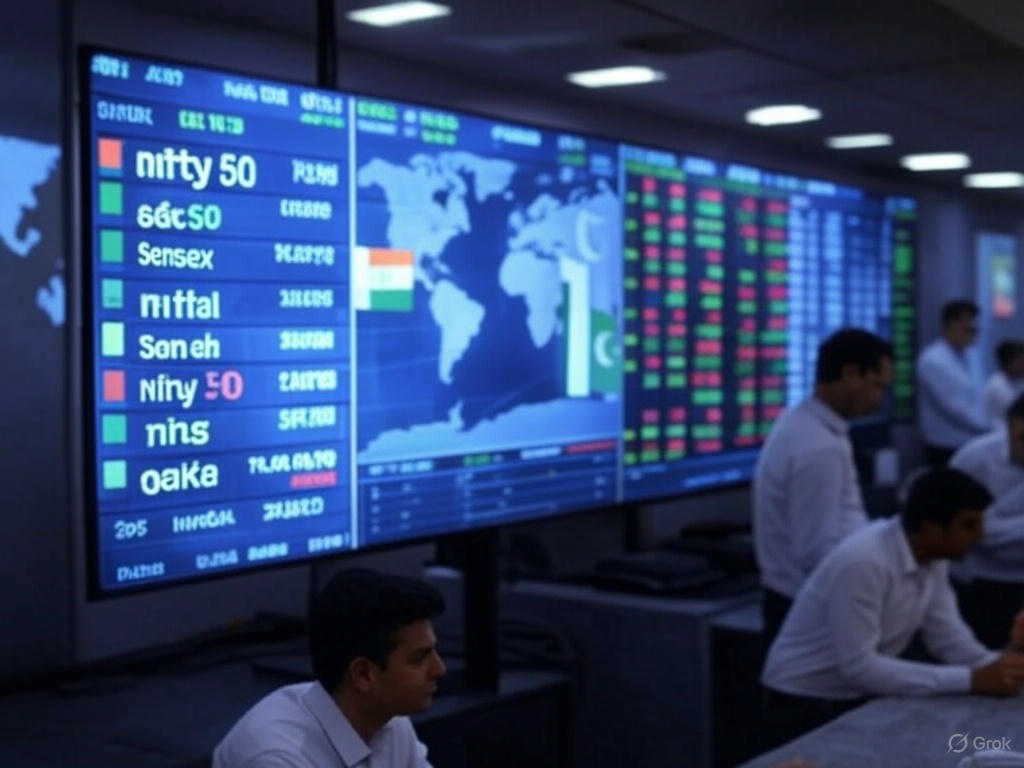Indian stock markets demonstrated resilience on Wednesday, May 7, 2025, as benchmark indices like the Nifty 50 and Sensex pared early losses despite escalating tensions between India and Pakistan. The ongoing conflict, marked by military actions and cross-border shelling, initially dented investor sentiment. However, by the close of trading, markets stabilized, reflecting a cautious yet optimistic outlook among investors navigating this geopolitical uncertainty.
Geopolitical Tensions Escalate
Contents
The current India-Pakistan conflict intensified following a deadly terrorist attack in Kashmir last month, which India attributed to Islamist militants based in Pakistan. In retaliation, India conducted airstrikes on targets in Pakistan and Pakistani Kashmir. Pakistan responded by shooting down five Indian fighter jets, marking the most severe military confrontation between the two nuclear-armed neighbors in over two decades.
On May 6, 2025, India launched “Operation Sindoor,” striking nine sites in Pakistan with missiles, targeting what it described as “terrorist infrastructure.” Pakistan condemned these actions and warned of decisive retaliation, further heightening fears of a broader conflict. Additionally, India suspended the Indus Waters Treaty, leading to water flow disruptions in Pakistan, which some Pakistani officials have described as an “act of war.”
International efforts, including calls from the United States and China for de-escalation, have so far failed to calm the situation. On May 7, India announced civil defense drills across seven states, the first such exercises since 1971, signaling heightened preparedness.
Market Reaction and Performance
The Indian stock market, sensitive to geopolitical risks, reacted swiftly to the escalating tensions. The benchmark Nifty 50 index opened 0.6% lower but closed at 24,379, down just 0.3%. Similarly, the BSE Sensex started the day in negative territory but ended at 80,641.77, down 0.2%. This partial recovery suggests that investors are adopting a wait-and-see approach, assessing the potential for further escalation.
Sector and Stock Performance
| Sector/Index | Performance | Key Observations |
| Nifty 50 | -0.3% | Opened 0.6% lower, pared losses to close at 24,379. |
| BSE Sensex | -0.2% | Closed at 80,641.77, showing resilience after early declines. |
| Nifty PSU Bank Index | -4.8% | State-run banks like Bank of Baroda (-10.9%) were among the top laggards. |
| Mid-Cap Index | +0.3% | Smaller companies showed slight gains, possibly due to defense spending expectations. |
| Defense Stocks | Mixed | Paras Defence (+2%), Bharat Electronics and Hindustan Aeronautics fluctuated. |
Nine out of thirteen major sectors traded lower, reflecting broad-based caution. The Nifty PSU Bank index was a significant underperformer, plunging 4.8%, with stocks like Bank of Baroda dropping 10.9% after disappointing quarterly results. Other public sector banks, including Bank of India and Canara Bank, fell 5-7%. Meanwhile, the mid-cap index rose 0.3%, indicating that smaller companies may be less impacted or even benefiting from increased defense spending.
Defense stocks presented a mixed picture. Paras Defence and Space Technologies gained 2%, likely due to expectations of increased defense contracts amid the conflict. However, major players like Bharat Electronics and Hindustan Aeronautics experienced fluctuations, reflecting uncertainty about the long-term impact of the tensions.
Expert Insights
Dharmesh Kant, head of equity research at Cholamandalam Securities, noted that the market is exercising caution due to the geopolitical situation. “Investors are wary of the potential for further escalation, which could disrupt economic stability,” he said. “However, the initial sharp reaction has been moderated as there are no immediate signs of a full-scale war.”
Market analysts also highlighted that short positions taken in anticipation of Indian retaliation are now being covered, contributing to the partial recovery in stock prices. Foreign portfolio investors were net buyers worth ₹3,795 crore on May 6, while domestic institutional investors sold equities worth ₹1,398 crore, indicating mixed sentiment.
Historical Context and Market Resilience
Historically, Indian equity markets have shown resilience during periods of geopolitical tension. For example, during the Kargil conflict in 1999, markets experienced a sharp correction but quickly recovered as the conflict remained localized. An analysis by Anand Rathi Research suggests that even in the event of substantial escalation, the Nifty 50 is unlikely to correct more than 5-10%.
The report further notes that, except for the 2001 Parliament attack, Indian markets have rarely seen corrections greater than 2% during times of heightened tension with Pakistan. On average, equity market corrections during conflicts have been around 7%, with a median of 3%. This historical precedent suggests that while the current situation is concerning, a prolonged market downturn is unlikely unless tensions escalate significantly.
Investment Strategy Amid Uncertainty
Analysts recommend that investors maintain their current allocations, with some suggesting that those with equity gaps in their portfolios consider investing now to align with strategic allocations like the 65:35:20 strategy (65% equity, 35% debt, 20% cash). The Anand Rathi report advises, “Based on historical precedent and current global risk pricing, even in the event of a substantial escalation, we believe the Nifty 50 is unlikely to correct more than 5–10%.”
Investors should also keep an eye on global factors, such as the US Federal Reserve’s rate-setting meeting on May 7, 2025. While the Fed is expected to keep interest rates unchanged, comments from Chairperson Jerome Powell on inflation and growth could influence near-term market trends.
Conclusion
As the India-Pakistan conflict remains fluid, the Indian stock market is likely to experience continued volatility. Investors will closely monitor developments, particularly any signs of de-escalation or further intensification. For now, the market’s ability to pare initial losses suggests a degree of resilience, but sustained stability will depend on diplomatic efforts to resolve the tensions. While short-term corrections are expected, historical trends and expert analyses indicate that the impact on the market will likely be limited unless the situation escalates into a full-scale conflict.
Disclaimer: This article is for informational purposes only and does not constitute financial advice. The information provided is based on current events and market data as of May 7, 2025, and is subject to change. Investors should conduct their own research and consult with financial professionals before making investment decisions.




